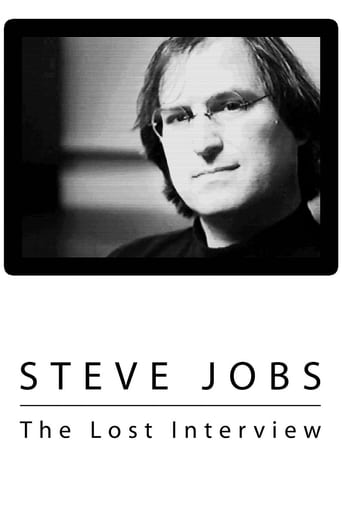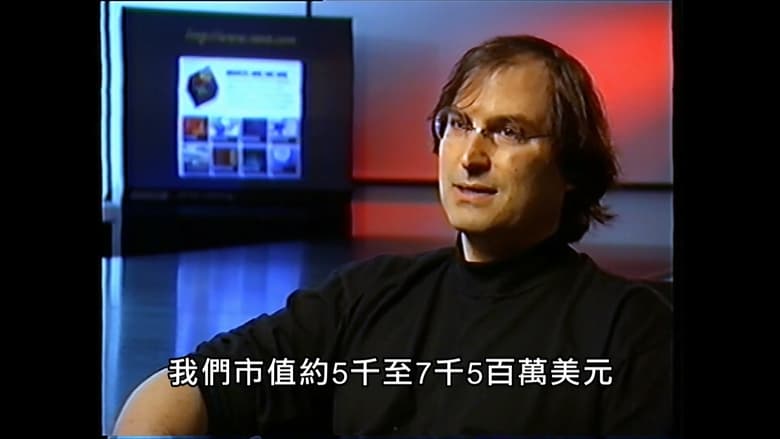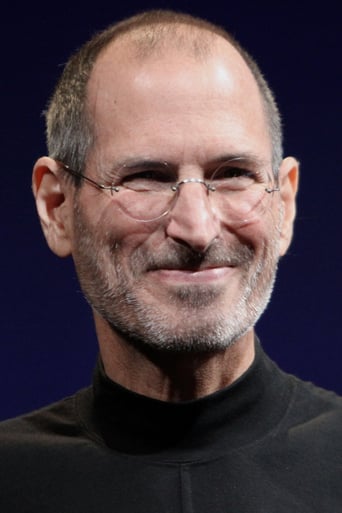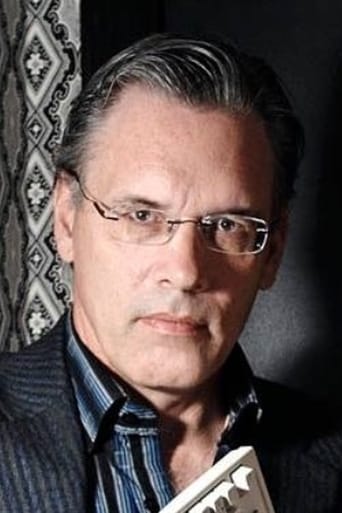

Steve Jobs: The Lost Interview (2012)
In a television interview filmed in 1995, Steve Jobs talks frankly about his early life, competition with Microsoft and his vision for the future, while he was running NeXT, the company he founded after leaving Apple.
Watch Trailer
Cast


Reviews
A conversation with Steve Jobs circa 1995 as he was running NeXT, the company he had founded after leaving Apple.Now, maybe it's just me, but it seems like Steve Jobs was a key figure for the second half of the 20th century. Maybe just even the last quarter. But such a big part of our world today. I am not a fan of Apple, but there is no denying the power they have. And having grown up in the 80s and 90s, I really appreciate how candid Jobs is when he speaks about the history of computing. This is the third or fourth Jobs film I've watched, and I feel like I learn something new each time.And I love how he believed that without blue box, there would be no Apple. I was never a hacker or a phreaker, but I was aware of it, and was involved in BBS culture. So I can completely understand how the computer revolution came out of hacking culture and from clever young people who were reverse engineering bigger technologies and finding their weak spots.
A rare glimpse into the mental and emotional thought process ascribed to a modern genius. I was extremely surprised at how congenial Steve interacted and replied to Cringlely's limited line of questioning. You could see the introspection and sincere desire to share his life experiences. I was completely shocked to see how deeply hurt, if just by a few additional blinks, he felt after Sculley's firing. I imagine this rage repression contributed to his isolation and alienation.As I was involved in Xerox Parc Beta site testing of their 1979 Windows product, I also felt the inventive aspects of their object oriented user interface was above my head. That Jobs admitted this as well was alarmingly breathtaking, the likes of which would never be revealed again.He, unlike Gates, freely admits to stealing, and appeared to justify his actions when he states that Xerox or HP just did not have the vision to implement their life changing ideas. He does not recall the huge argument over whether to allow his team to view the demo, I do not believe this. I assume there was a negotiation as Jobs knew this was something that would propel his company into the next stratosphere of existence.The NeXt product line seemed to be almost an embarrassment to him but of course that could not be the case. His humble description of it's goals were so understated compared to every other product he developed.I agree with his assessment of learning a computer language to improve critical thinking skills as it greatly enhanced mine. I was in awe that after Cringely admitted that his use of APL did not make any impact, Jobs just shrugged it off. Wait a minute, an opportunity to share why he feels so strongly about changing a college curriculum and he just let's the topic go was a HUGE disappointment. I also like the fact that he elaborated on his Hippie vs Nerd connotation and promoted the rank of geek to genius.Extreme high recommend for any business owner, PC enthusiast, technology history, and all dreamers. This was an exceptional insight into a man with exceptional vision and product ethics.
I've read "Steve Jobs", an authorized biography, by Walter Isaacson and for me this interview cover most of aspects of this remarkable visionary. It spans through almost all of history of high-tech, telling us about things that we use without noticing them in our life today as extensions of our human being.I've seen "jOBS" which I rated 7/10 because it didn't mentioned "the little blue box" which is very important as Steve Jobs is telling in this interview was one of things he remembered for life - even small things can empower small people with capability to rule billions worth of industries. And it is true, everything that is big grows from even smallest things. Visionary is a person who can see those small things that will change our life in the future.Steve Jobs was first to see the importance of GUI, mouse, desktop publishing, the internet, computers for schools. He had changed our life.
If there's one entrepreneur that deserves a seventy-two minute theatrical interview, it's Apple's Steve Jobs. Whether or not you like or support the infectious company, it is no doubt that Jobs was an incredible man of business, craft, and personality, one who provided shock treatment to Apple when bankruptcy was looming and one of incredible enigma and intelligence.In 1995, filmmaker Robert X. Cringley sat down with the legendary Jobs a decade after he departed from Apple after contentious, power-hungry relations with John Sculley. At seventy-two minutes, a lengthy interview with Jobs was exceptionally rare due to the fact that he stayed out of the limelight and rarely let his true charisma and insight be revealed to the public. During this time, Jobs was the founder of his self-made company, NeXT, which he would then sell to Apple in 1996 to become the CEO of the company, producing a number of gadgets and time-savers that would eventually morph into things people seemingly couldn't live without. He makes very clear in the interview that he wants to make each generation better and better with a new and consistent line of technology. It's 2012, and we have already met such works as the iPod, the iPhone, the iTouch, the Mac computer, and the iPad, so it's needless to say that Jobs had hastily worked to make that vision a reality.The interview was filmed, some of it was spliced into Cringley's PBS series Triumph of the Nerd, until the entire thing was reportedly lost after being shipped from New York en-route to London. Not long after Jobs' death, it was discovered on VHS and released theatrically in very limited theaters and is now currently on several video on demand services before its official DVD release later this summer.During the interview, the loquacious, attentive, and always engaged Jobs talks in great lengths about his humble beginnings and fascinations with computers, how he researched at Hewlett-Packard, his friendship with Steve Wozniak, and gives a meticulous account of his vision for the future, his bold ideas, and continually presents himself with his unconditional charm and insights on his life and interests.One of Jobs' many metaphorical references to his life is how, when he was young, he assisted an elderly man with chores that lived on his block, despite his ominous appearance and vibes. One day, the man showed him a rock-tumbler, where he put in ugly-looking stones, some liquid, and some grit-powder. He told Jobs to come back the next day, and when he did, the stones were shiny and polished, from the intense liquid bath and the friction they created from rubbing against each other. Jobs states that humans are the same way when put in a situation together that tests them intellectually. They will have to clash with other people, share different ideas, maybe argue a little bit, before creating something that is unique and impressive.One of the final questions brought up by interviewer Cringley (who is heard, but never seen) is what are Jobs' views on Microsoft as a company. "Microsoft is McDonalds," Jobs replies. He states how they have a great success story and model, but have no creativity or substance behind their relatively bland products - strangely harsh words from a man so close with Bill Gates. But the interview itself it full of these kinds of surprises.Steve Jobs: The Lost Interview can't be called a film, for as it is one long, static shot of Steve Jobs, occasionally interrupted by a freeze-frame and a voice-over of Cringley wording the questions he remembers asking, and begins with a very brief introduction explaining the origins of this interview by Cringley himself. The only problem in sight with the interview is it neglects to provide the viewer with more context or history leading up to this point in Jobs' life. The filmmakers were probably riveted to find the lost footage and anxiously impatient to show it to the public as fast as possible. Nevertheless, the raw footage we get is compelling and intriguing and could brew a new documentary on Jobs in and of itself.Starring: Steve Jobs and Robert X. Cringley. Directed by: Paul Sen.



